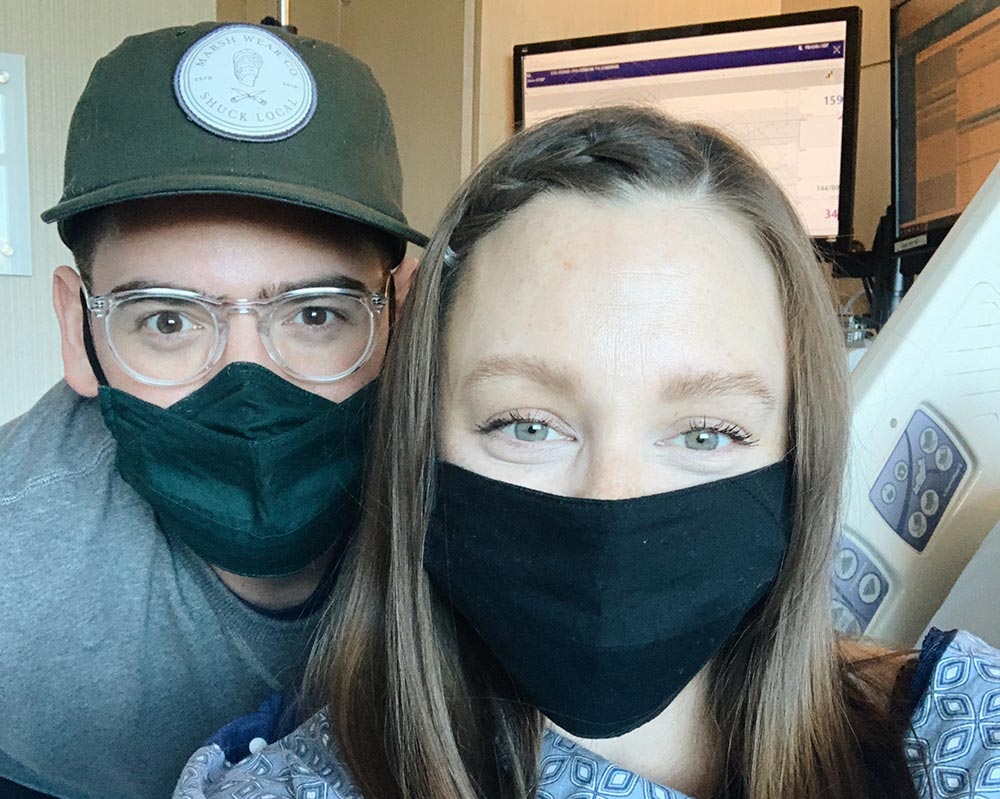Childbirth Advice From a Father of Four

What I learned about being a supportive partner in birth and beyond.
I’ve been a father for almost eight years and have four children ranging from 2 to 7 years old. After witnessing labor, delivery, and the aftermath four times, I will go out on a limb and say that no two births are ever the same, but there are some consistent themes to draw from as the childbirth partner.
Of course, I did not birth my children (and should leave the advice on actual childbirth to my wife). At best, my role during these deliveries could be likened to that of a co-pilot. My wife was in the captain’s seat, but occasionally, I would calmly assert myself as needed—and I picked up a few lessons along the way. If you’re preparing to be a first-time birth partner, I’m sharing the tips—and a few hard-to-swallow facts—I wish I had known beforehand.
It’s Always About the Birth Parent
Becoming a dad was super exciting. I had so many fantasies about how things would go, like hoping my firstborn would be delivered at the same hospital as me and wanting to be the one to give her first bath. I realized it was not about me fairly quickly (as in during the first prenatal appointment). The doctor rarely spoke directly to or made eye contact with me, which oddly didn’t rub me the wrong way. It simply helped reinforce the understanding that it was about my wife and our baby. While there were still times for me to voice my hopes and dreams for our shared experience of becoming parents, I still maintained a position of being on the sidelines, cheering her on throughout the process. So if you’re like me, one of the first things you may have to do as a birthing partner is kindly get out of the way.
Understand What Your Insurance Covers
After a few times around the billing block, I’ve learned that it’s crucial to get ahead of all the nonsense you may have to deal with regarding medical bills. If you can prepare and know what to expect, significant weight can be lifted off your partner’s shoulders, allowing them to focus on what’s truly important.
An excellent place to start understanding your policy’s maternity coverage is to call your insurance company to ask about estimated costs for different types of births and corresponding procedures and interventions. Next, contact your birth facility and confirm if your plan covers all the doctors and foreseeable staff members involved in the delivery. For example, while your insurance may cover your chosen hospital and OB, the contracted anesthesiologist or the in-house pediatrician may not be, and you might get a surprise bill with an out-of-network total. (It happens more often than you think!)
While frustrating, it’s technically up to your insurance company to work with out-of-network providers to come to an agreement. One way to try and avoid this predicament is by asking providers on the spot if they’re contracted or affiliated with the hospital, and in some cases, when possible, request a different service provider.
This scenario can also happen with routine lab work during prenatal appointments, so make sure the samples are processed at a lab within your network. (Ask me how I know.) I also learned that it could be cheaper to self-pay at the hospital, depending on the circumstances of your birth. Even with a decent insurance plan, my wife and I paid more out-of-pocket for one delivery than we would have if we had self-paid. While it’s often hard to stomach, it’s worth knowing the total amount you will owe upfront for reference as you make financial arrangements.

Know the Plan—and the Backup Plan
Make sure you fully understand your partner’s birthing plan. If you have questions, ask them. If you’re unclear about a specific detail, take the time to clarify what’s written. Remember: your partner is the pilot, and you’re the copilot. Sometimes, they cannot communicate their wishes to the different health care providers coming in and out of the room (primarily during shift changes). It’s your job to know what your partner wants and do your best to ensure it’s honored as much as possible.
Of course, not all birth plans go as planned, so it’s good for you to know your partner’s backup plan for delivery as well. For example, your partner wants to labor in water because it’s a calming environment, but there’s no room available with a tub. So instead, you utilize all other calming factors in the birthing room, such as dim lighting, minimal interruptions, soothing music, and aromatherapy. This scenario is undoubtedly a plan B, but it’s a plan B you can anticipate and help execute on the spot.
It’s also important to note that some doctors and nurses can be pushy. Many hospitals are known for their efficiency, but maybe your partner doesn’t want an “efficient birth” and instead values being heard and having expressed boundaries respected. If they don’t want a particular procedure, intervention, or practice, you need to have that discussion and come to an understanding before you arrive at the hospital. Then, you need to help communicate that to medical staff, as long as your partner is comfortable with you doing so. I’m not saying to speak for your partner; just advocate for and support them.
Keep Your Witts About You
As the delivery day nears, stay sober and save the celebration for after baby arrives. What will you do if you’re supposed to drive your partner to the hospital when labor ramps up, and you’ve had one too many Manhattans? Even if you have other means of transportation or the plan is to give birth at home, you’ll want to have a clear and level head ready for the monumental task at hand. I’d recommend that you plan to lighten up on the libations during the last three or four weeks of pregnancy—according to the estimated due date. (Plus, after running the numbers for your insurance coverage, you probably won’t want to add “ambulance transport” to the itemized receipt.)
It seems obvious when blatantly spelled out, but if you enjoy a drink or two after a long day (especially later evening hours), you must remember that a baby can come anytime, day or night. No matter if your partner is 36 weeks or 42 weeks, they will likely appreciate that you chose to prioritize their safety and security. I’ll also add this often-annoying piece of advice: try to get more sleep. You may be headed into a 3 a.m. delivery, so don’t stay up past midnight, or you will regret it. Trust me; you may not sleep for the next 48 hours once labor is underway.
Be Present From Start to Finish
Don’t let your mind drift. Get off your phone. Turn off the TV. We all may struggle with this stuff daily, but let me remind you that this birth will only happen once, and you don’t want to miss it. Let your partner take the lead on what’s happening in the room while you focus on them and their needs. When it’s time for your baby to arrive, focus on verbal encouragement like, “You’re incredible!” or “You’re doing this!” and pay attention to what’s happening. Your partner may want you to help them remember specific details from this special event later on or hear about it from your point of view. Your ability to recall the power and strength they showed during birth is essential.
After your baby arrives, your partner will be exhausted (like, there’s probably nothing to try to compare it to kind-of-tired). Continue to stay present—and awake! Did you just push out a baby? Nope. So let your partner get some sleep if they want it and take over for a little while, but only if that’s what they want.
Car Seats Are Not Intuitive, So Start Practicing Now
A car seat is arguably one of the most important purchases you can make for your new baby, but they’ll also give you a few (more) gray hairs. To avoid future panic, ensure you’ve figured out how to install (and uninstall and reinstall) the baby’s car seat well before delivery. To this day, I am still cursing under my breath every time I have to mess with one of my kids’ seats because they are all different and difficult, in my opinion.
And by the way, you’ll be carrying your baby out of the hospital in their infant seat, meaning you can’t wait until it’s time to be discharged to figure out how to operate the release button on the car seat base. You’ll need to unlatch it beforehand, bring it into the recovery room, safely strap your newborn inside, and have it checked for accuracy by a nurse before leaving. And let me tell you, that initial drive home from the hospital with our first baby was terrifying. We had to drive on the highway, and I’ve never had more precious and delicate cargo on board. It felt like I was driving for the first time, so maybe think about the route you’ll be taking home, too.
Whatever Your Partner Needs, Your Partner Gets
So, you’re home after possibly the wildest, most beautiful, terrifying, anxious, and exhausting 72 hours (or more) of your life—but it’s not over yet. After you settle in at home, there may be prescriptions to pick up, pediatrician visits to schedule, and family calls and texts to intercept. Maybe your partner hasn’t eaten a real meal or had a decent shower. Whatever their needs are, just be available. If you notice their water bottle is low, refill it without being asked. (I’ve been told breastfeeding makes you very thirsty.) Ask them if they need a snack or a second serving of whatever they eat. Offer to handle any logistics you can, and try to be an empathetic listening ear as they navigate the newness of being a parent. Additionally, keep an eye out for signs of postpartum depression (PPD) and postpartum anxiety (PPA), as your partner may be too preoccupied and sleep deprived to notice—or even accept—the possible changes.
You’ll Never Be Fully Prepared, but Your Heart Is Ready
Looking back on it all, I realize you can’t possibly fully prepare for birth or parenting, but it’s OK because adding a baby to the mix has a way of molding you and changing the landscape of your life, whether you feel ready for it or not.
Those first few weeks with our firstborn were filled with highs and lows, some self-doubt, and a lot of just “doing our best” to get through it. But I eventually began to trust that our daughter simply needed us, that along with bottles and diaper changes, our presence was enough at that time. Once I believed I was capable (even though I still felt like I had a lot of growing up to do), I started bonding with my daughter on a deeper level and felt more connected to my fatherhood.
Now, almost seven years later, my heart has grown immensely, and I know with confidence that things work out, even if they start off as messy situations. And as a quick sidenote to anyone out there who worries they won’t make a good father because of their relationship (or lack thereof, in my case) with a parent, know that you can write a new story with your parenthood, and it will be your greatest work.
In the meantime, glean insight from others who have been through it before and pay it forward once you’re on the other side.







